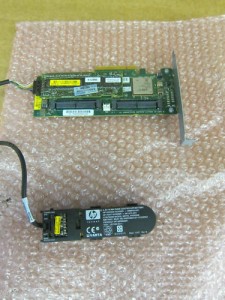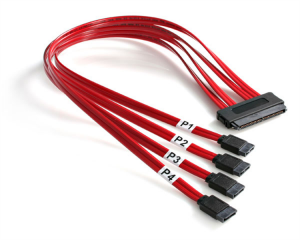Continuing with my exploits at rebuilding my HP ML115 G5 based home server running ESXi 5 I’ve now turned my attention to data resilience by looking at a hardware RAID solution.
After a bit of research I decided on using an HP Smart Array P400 Controller as it seems to be a good balance between performance and cost, particularly when coupled with the optional 512MB battery backed accelerator cache. Another reason for choosing the P400 controller is that it appears on the VMWare ESXi Hardware Compatibilty List.
There are lots on eBay for a reasonable price, many of which appear to be pulled from decommissioned enterprise rack servers. I got mine for £60 including the 512MB cache and battery.

The P400 features 8 channels split across two SFF8484 connectors. Typically these are connected to hot swap SAS drive cages but they can also be connected directly to attached SATA drives using an SFF8484 to SATA breakout cable, such as this one sold by Startech.
I’ve never used a hardware RAID solution before so it’s a new learning experience for me. The process involves using the HP Array Configuration Utility (ACU) – which can be booted from CD/DVD or USB flash drive – to create a new array containing the desired physical drives, and then on this array creating a logical drive in the required RAID scheme. For my initial tests I’m going to use a couple of HP 160GB SATA drives configured as a simple RAID 1 mirror which will hopefully give me the data resilience I need. With more drives available other options such as RAID 1+0 or RAID 5 are possible.
I want to do some testing with this configuration, including ensuring it works fine with ESXi and also by removing one of the drives to simulate a failure so I can understand how it handles an array in a degraded state and how it recovers. Assuming everything goes well and I am happy with it all I will then look at converting my current live ESXi installation over to RAID 1 scheme using the existing 250GB HP SATA drives I have. Fingers crossed it all goes OK!
